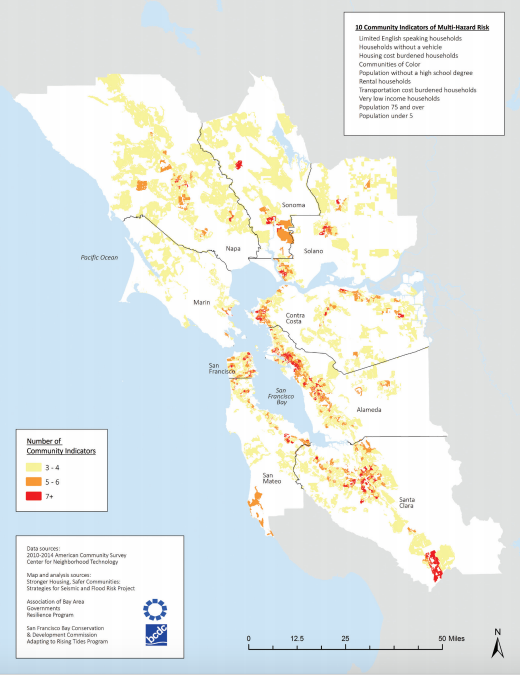Connecting state and local government leaders
But a design challenge focused on resiliency currently underway hopes to change that.
Resilient by Design’s Bay Area Challenge chose 10 winning teams to each propose a project addressing resilience threats like sea level rise, severe storms, flooding or earthquakes in a critical region they identify.
Social inequalities and California’s affordable housing crisis compound resilience shocks in the Bay Area, making it harder for at-risk communities to rebound.
Out of 51 submissions across 13 states and nine countries, challenge judges selected multidisciplinary teams consisting of architects, engineers, urban designers, ecologists, hydrologists and sustainability experts.
“What’s really valuable about the project is so much about the climate field has been led by scientists and traditional environmental groups, and it needs to be shifted over,” said Allison Brooks, who chairs Resilient by Design’s executive board. “The Bay Area is growing, and some of the most vulnerable communities are along the shoreline in harm’s way. It is poorer people who are on the frontlines of risk and have the hardest time bouncing back from these issues.”
While the Bay Area isn’t threatened by hurricanes like the East and Gulf coasts, California is not immune to extreme weather events. The Golden State just emerged from an extreme, five-year drought with an incredibly active rainy season that highlighted regional vulnerabilities due to flooding, including low-income families in San José who were displaced in February when Coyote Creek overflowed its banks into low-lying neighborhoods.
Nuisance flooding is becoming more commonplace and can disrupt highly vulnerable transportation infrastructure, Brooks said.
Add to that earthquakes, wildfires and a high cost of living, and the need for greater social cohesion among Bay Area communities to address such problems becomes apparent.
The Bay Area Challenge aims to engage communities in planning around resiliency and phasing large infrastructure and nature-based projects to ensure there’s time to properly fund them.
Winning teams picked for those two purposes are: All Bay Collective, BIG + ONE + Sherwood, BionicTeam, Common Ground, The Field Operations Team, HASSELL+, The Home Team, Permaculture + Social Equity, Public Sediment and Team Uplift.
Those teams are currently touring the East Bay subregion and will come back in October to explore the North Bay and South Bay, including Silicon Valley, as part of the “research phase.” In November the focus will be San Francisco, including a design critique.
Along the way, teams will get the lay of the land and speak with heads of agencies supervising everything from water to parks. Then they’ll present three to five opportunities they see for greater resilience, which the challenge’s Research Advisory Committee will evaluate before matching each team to an opportunity by the end of November.
“We really believe we need to learn from the people who live in these places and are most affected by these resilience issues, and they need to be part of the development of these strategies and solutions,” Brooks said.
Some projects may be highly localized and involve raising local funds, but the goal is to touch every one of the Bay Area’s nine counties with the 10 final projects.
The teams will be responsible for coordinating with state and local governments and private stakeholders to develop a thorough implementation plan, where they drive the work schedule. At the end of the “design phase,” in 2018, teams will receive $150,000 out of a $4.6 million challenge grant from The Rockefeller Foundation.
Brooks also serves as executive director of the Bay Area Regional Collaborative, created by statute to coordinate the planning efforts of the Association of Bay Area Governments, Bay Area Air Quality Management District, Bay Conservation and Development Commission and Metropolitan Transportation Commission. BARC’s governing board focuses on climate change adaptation and mitigation across 400 miles of shoreline and has performed regional mapping to identify its most vulnerable communities—mapping that will inform the teams’ work.

In a September draft report, “Raising the Bar on Regional Resilience,” BARC outlines 10 factors contributing to vulnerability and mapped their concentrations throughout the Bay Area as seen in the map above. Age, language, ethnicity, economic status, housing tenure and transit dependence are among them, according to the report:
”In other words, many people in these at-risk communities lack the financial means, physical capacity, necessary information, or access to services to adequately prepare for, respond to, or recover from current and future hazards. Many households in the Bay Area’s most vulnerable shoreline and fault zone communities are burdened by the high housing and transportation costs prevalent in our region. Such households are less able to invest money in their homes to prepare for natural disasters. If displaced from damaged homes, they are also likely to struggle to find alternative housing that is affordable and near to the jobs, schools, medical facilities, and other services on which they rely.”
Some of the final projects will inevitably include development of affordable housing and land-use investments around the built environment to assist the Bay Area’s most vulnerable populations and prevent them from being displaced before or after a disaster.
“We’re losing our diversity. We’re losing our cultural heritage,” Brooks said of what’s at stake in the region. “We’re losing what made the Bay Area such a special place.”
Dave Nyczepir is a News Editor at Government Executive’s Route Fifty and is based in Washington, D.C.

NEXT STORY: These U.S. Regions Could Be First in Line for Hyperloop Expansion




